Unit 1 How can we become good learners? Section B 知识点练习课件
文档属性
| 名称 | Unit 1 How can we become good learners? Section B 知识点练习课件 |  | |
| 格式 | ppt | ||
| 文件大小 | 557.5KB | ||
| 资源类型 | 教案 | ||
| 版本资源 | 人教新目标(Go for it)版 | ||
| 科目 | 英语 | ||
| 更新时间 | 2022-03-05 19:17:53 | ||
图片预览

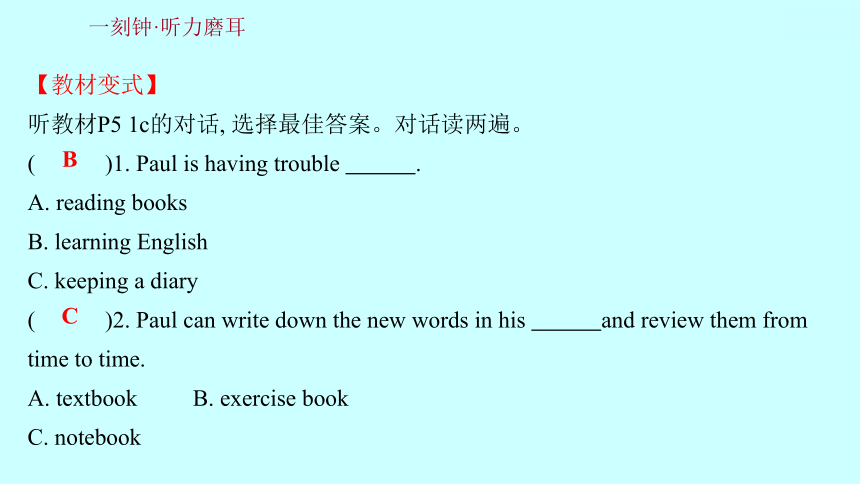
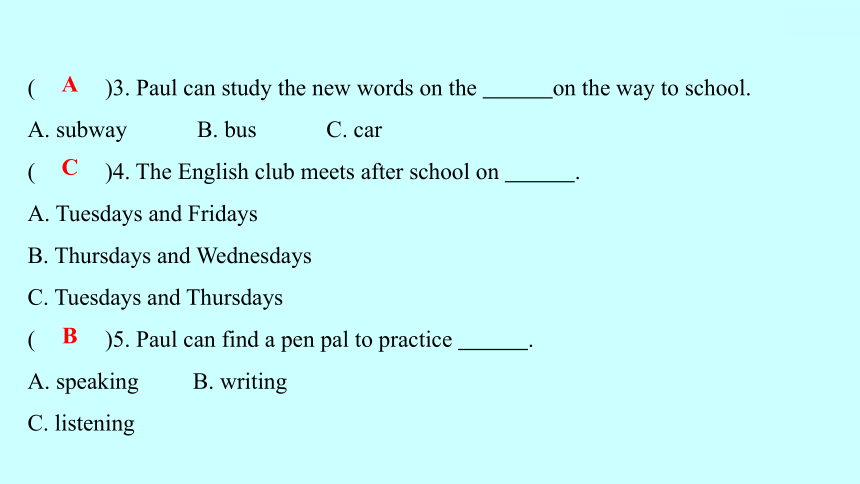
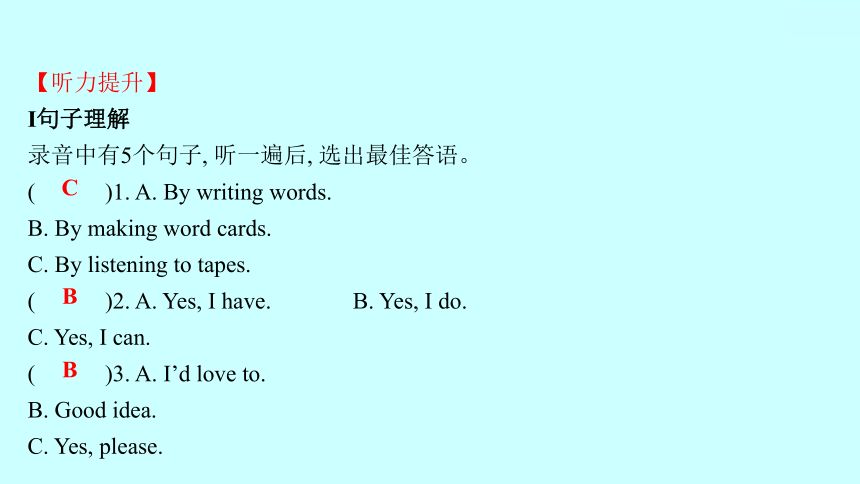

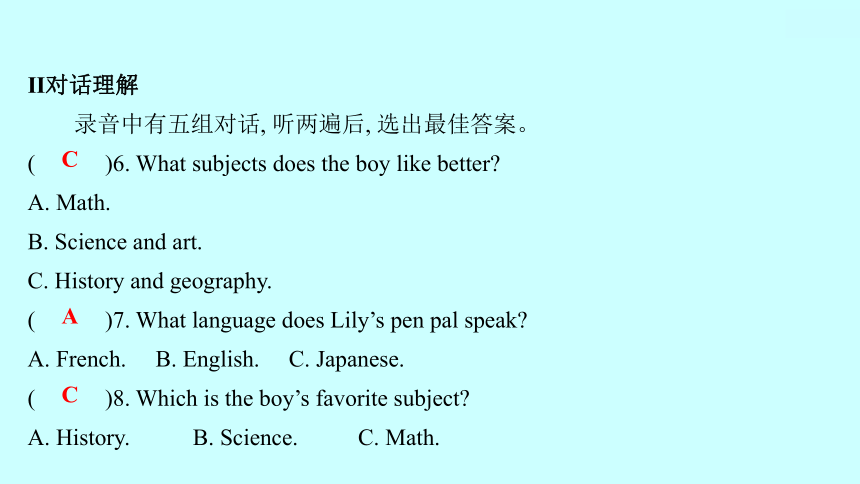
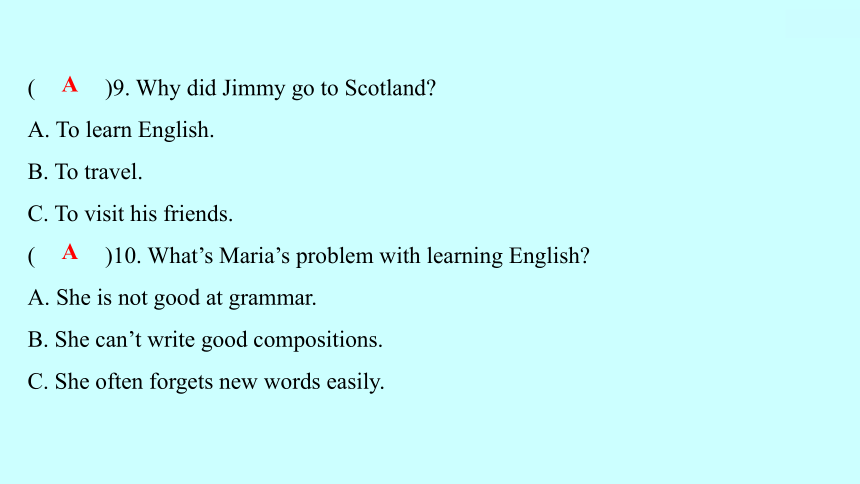
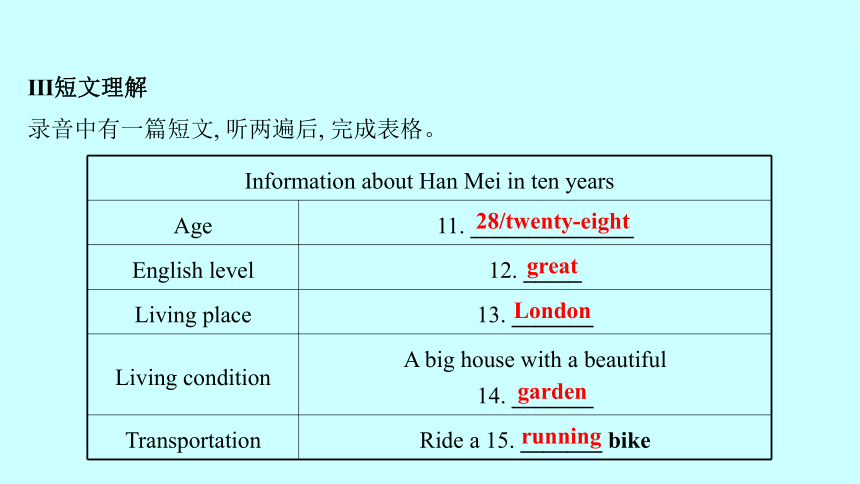
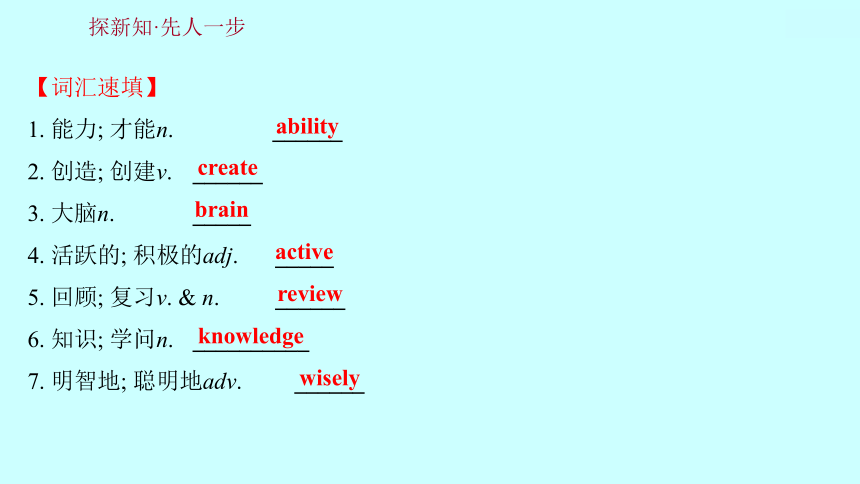
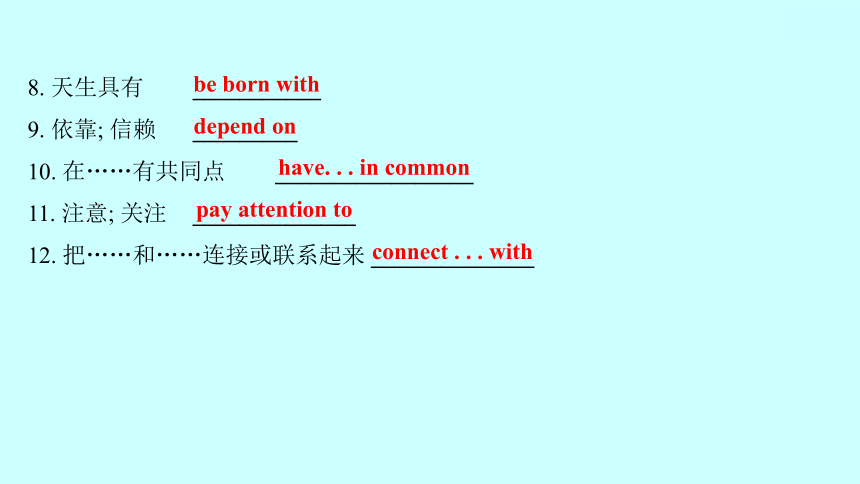
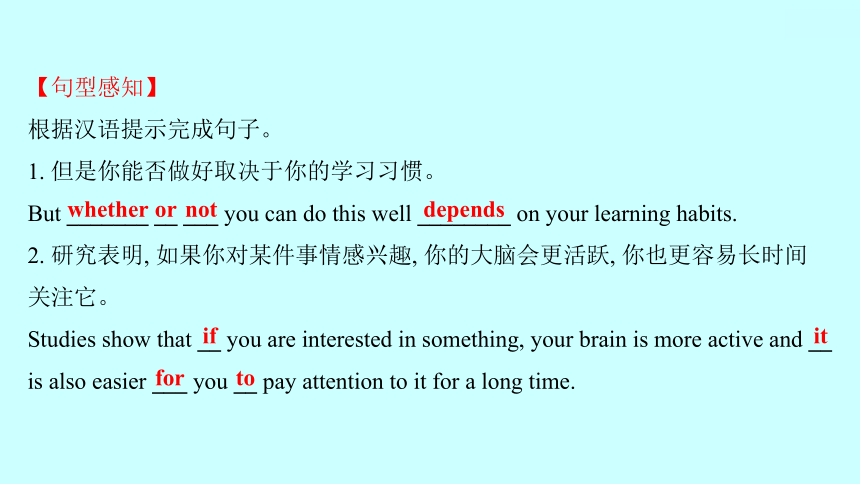
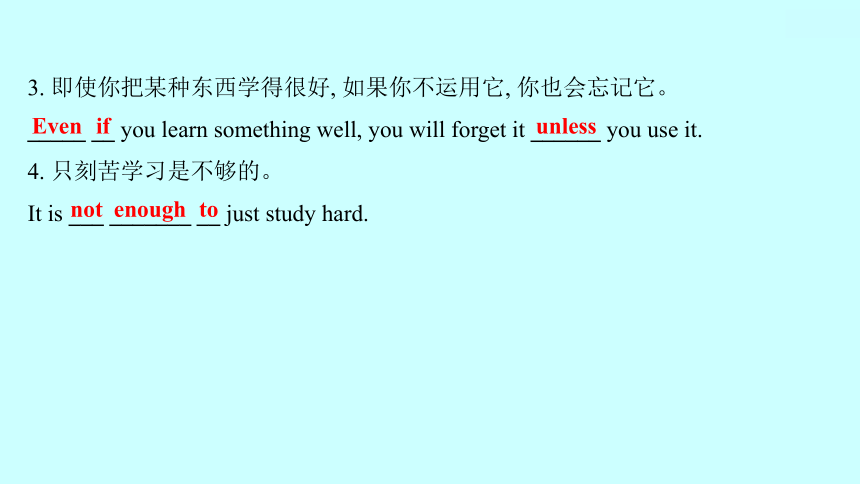
文档简介
(共47张PPT)
Unit 1
How can we become good learners?
Section B
【教材变式】
听教材P5 1c的对话, 选择最佳答案。对话读两遍。
( )1. Paul is having trouble .
A. reading books
B. learning English
C. keeping a diary
( )2. Paul can write down the new words in his and review them from
time to time.
A. textbook B. exercise book
C. notebook
一刻钟·听力磨耳
B
C
( )3. Paul can study the new words on the on the way to school.
A. subway B. bus C. car
( )4. The English club meets after school on .
A. Tuesdays and Fridays
B. Thursdays and Wednesdays
C. Tuesdays and Thursdays
( )5. Paul can find a pen pal to practice .
A. speaking B. writing
C. listening
A
C
B
【听力提升】
Ⅰ句子理解
录音中有5个句子, 听一遍后, 选出最佳答语。
( )1. A. By writing words.
B. By making word cards.
C. By listening to tapes.
( )2. A. Yes, I have. B. Yes, I do.
C. Yes, I can.
( )3. A. I’d love to.
B. Good idea.
C. Yes, please.
C
B
B
( )4. A. Me, too.
B. You’re right.
C. It doesn’t matter.
( )5. A. I agree with you.
B. You’re welcome.
C. It’s too hard.
C
A
Ⅱ对话理解
录音中有五组对话, 听两遍后, 选出最佳答案。
( )6. What subjects does the boy like better
A. Math.
B. Science and art.
C. History and geography.
( )7. What language does Lily’s pen pal speak
A. French. B. English. C. Japanese.
( )8. Which is the boy’s favorite subject
A. History. B. Science. C. Math.
C
A
C
( )9. Why did Jimmy go to Scotland
A. To learn English.
B. To travel.
C. To visit his friends.
( )10. What’s Maria’s problem with learning English
A. She is not good at grammar.
B. She can’t write good compositions.
C. She often forgets new words easily.
A
A
Ⅲ短文理解
录音中有一篇短文, 听两遍后, 完成表格。
Information about Han Mei in ten years
Age 11. ______________
English level 12. _____
Living place 13. _______
Living condition A big house with a beautiful
14. _______
Transportation Ride a 15. _______ bike
28/twenty-eight
great
London
garden
running
【词汇速填】
1. 能力; 才能n. ______
2. 创造; 创建v. ______
3. 大脑n. _____
4. 活跃的; 积极的adj. _____
5. 回顾; 复习v. & n. ______
6. 知识; 学问n. __________
7. 明智地; 聪明地adv. ______
探新知·先人一步
ability
create
brain
active
review
knowledge
wisely
8. 天生具有 ___________
9. 依靠; 信赖 _________
10. 在……有共同点 _________________
11. 注意; 关注 ______________
12. 把……和……连接或联系起来 ______________
be born with
depend on
have. . . in common
pay attention to
connect . . . with
【句型感知】
根据汉语提示完成句子。
1. 但是你能否做好取决于你的学习习惯。
But _______ __ ___ you can do this well ________ on your learning habits.
2. 研究表明, 如果你对某件事情感兴趣, 你的大脑会更活跃, 你也更容易长时间
关注它。
Studies show that __ you are interested in something, your brain is more active and __
is also easier ___ you __ pay attention to it for a long time.
whether
or
not
depends
if
it
for
to
3. 即使你把某种东西学得很好, 如果你不运用它, 你也会忘记它。
_____ __ you learn something well, you will forget it ______ you use it.
4. 只刻苦学习是不够的。
It is ___ _______ __ just study hard.
Even
if
unless
not
enough
to
【语篇导读】
根据教材P6 2b内容判断正(T)误(F)。
( )1. Something interesting can make your brain active.
( )2. Good learners are also afraid of making mistakes.
( )3. Good learners can get knowledge from asking questions.
T
F
T
释·疑难
该句型中, 当形容词修饰人时, 使用介词of; 当形容词修饰动词不定式所表达的内容时, 使用介词for。
It’s very kind of you to help me. 你太善良了帮助我。
巧·运用
( )(2020·云南中考) It’s necessary masks (口罩) in public places during
the COVID-19 period.
A. for us to wear
B. for us wearing
C. of us wearing
D. of us to wear
A
考点2 pay attention to 注意; 关注
悟·语境
*Studies show that if you are interested in something, your brain is more active and it is also easier for you to pay attention to it for a long time.
研究表明, 如果你对某件事情感兴趣, 你的大脑会更活跃, 你也更容易长时间关注它。(P6)
*I didn’t pay attention to what he said. 我没注意他说的话。
*We must pay attention to listening to the teacher in class.
在课堂上, 我们一定要注意听老师讲课。
释·疑难 pay attention to的用法
pay attention to意为“注意; 关注”, 其中to为介词, 后面常接名词、代词或________
_____ (动词-ing形式/动词原形)作宾语。
巧·运用
①(2020·云南中考)It’s polite to ______________ (注意)the person when he or she is
talking to you.
②(2020·鄂州中考)To keep healthy, we should pay attention to _______ (wear)
masks and washing hands.
动词-ing
形式
pay attention to
wearing
释·疑难 even if和unless的用法
(1)even if意为“即使, 纵然”, 引导让步状语从句, 从句往往是假设性的; even though意为“尽管, 虽然”, 也可用于引导让步状语从句, 从句内容往往是真实的。
*Even if it should rain tomorrow, we will continue our work.
即使明天下雨, 我们也要继续工作。
(2)unless意为“如果不; 除非”, 常与if. . . not进行同义转换。在含有unless引导的条件状语从句的主从复合句中, 主句用一般将来时或祈使句或主句谓语中有情态动词, 从句常用一般现在时表将来。
*She will keep on singing unless she is told to stop.
她会一直唱下去, 除非有人叫她停止。
*You mustn’t drive on the road unless you get a driver’s license.
你不能在路上行驶除非你获得驾照。
巧·运用
( )①You will still miss the flight you catch a taxi.
A. even if B. as if
C. until D. before
( )②(2020·重庆中考)Nobody can hear you you speak in a louder
voice.
A. unless B. if
C. when D. after
A
A
A
C
B
have sth. in common; think about; make mistakes; take note; write down;explain ... to; a part of
短语
But whether or not you can do this well depends on your learning habits.
Even if you learn something well, you will forget it unless you use it.
It is not enough to just study hard
句型
拓展:
1. create v. → creative adj.
2. active adj. → activity n.
3. wisely adv. → wise adj.
单词
Unit 1 Section B (2a~2e)
认知:ability; brain; overnight; review; knowledge; lifelong
◆应用:born (be born with); attention (pay attention to); connect (connect ... with)
【5分钟·基础通关】
Ⅰ根据句意及汉语提示完成单词(每小题1分, 共5分)
1. The more you use your _____ (大脑), the cleverer you will be.
2. (2020·苏州中考) The future is something we ______ (创造), but not something
we enter.
3. Although he’s nearly 80, he is still very _____ (活跃).
4. We should ______ (复习)what we learned before a test.
5. Do you know how to train our _______ (能力) to listen, speak, read and write
练考点·胜人一筹
brain
create
active
review
abilities
Ⅱ用所给词的适当形式填空(每小题1分, 共5分)
1. (2020·大庆中考) The teacher told us to pay attention to _______ (spell) English
words.
2. Parents hope children can spend their money ______ (wise).
3. Be more careful! Don’t make any ________ (mistake) in your writing.
4. Some students don’t have much __________ (know) of American history.
5. It’s kind of you ______ (help) me with my English.
spelling
wisely
mistakes
knowledge
to help
Ⅲ单项选择(每小题1分, 共5分)
( )1. When you read a book, your mind will work it.
A. for B. with C. on D. of
( )2. (2020·连云港中考) The Chinese language has become a bridge to
China the rest of the world.
A. connect; to B. translate; into
C. compare; with D. separate; from
( )3. (2020·湘潭中考) is necessary for us to wash hands when we are
back home.
A. It B. That C. This
C
A
A
( )4. (2020·安顺中考)Even if we learn something well, we will forget it
we use it.
A. while B. until C. unless
( )5. —Steve, in order to improve your English, you should practice more.
—I agree. .
A. It’s a piece of cake
B. Practice makes perfect
C. It serves you right
D. Easier said than done
C
B
Ⅳ完成句子(每小题1分, 共5分)
1. (2019·襄阳中考)他说“一带一路”将会把中国和越来越多的欧洲国家成功地联
系起来。
He said the Belt and Road will successfully _______ China ____ more and more
European countries.
2. 植物依靠太阳才能生长。
Plants _______ ___ the sun for their growth.
connect
with
depend
on
3. (2019·铁岭中考) 南北方的菜肴有共同之处。
The dishes in the north and south have something __ ________.
4. 他生来记性就好。
He was _____ ____ a good memory.
5. (2019·抚顺中考)不但中国的孩子们, 而且还有西方的孩子们都对《西游记》
感兴趣。
Not only Chinese kids but also western kids ___ _________ __ Journey to the West.
in
common
born
with
are
interested
in
【10分钟·素养通关】
Ⅴ完形填空(每小题2分, 共20分)
(2020·长沙中考)
As a university student, I decided to learn German. For some reason I really liked the language, but I was not very good at learning it. The grammar 1 me a lot and even drove me crazy. My only advantage was 2 —I got an A on every word test I took. After two years of studies, I struggled(挣扎) to communicate in 3 German and signed up to study in Germany to complete my degree. It was the 4 term I would ever have.
The moment I arrived in Germany, I felt like I was starting from scratch (从头开始). The German I’d learned in university wasn’t 5 for everyday conversation. My book knowledge fell by the wayside as I thought about the basics of getting around, reading emails and talking with my classmates. I was often nervous at school, worried about whether the teachers would call on me in class and whether I’d understand their questions. I only 6 a little around my eight roommates, who were willing to speak German slowly to me and didn’t seem to mind my 7 .
I chose to study three courses—reading & writing, grammar and history. All were in German and difficult, but the history class was the worst. The teacher spoke so 8 that almost everything he said flew right over my head. I sat in the front, took notes and even recorded every single word he said in class, but 9 helped. I had no idea what the class was really about. . .
Years have passed, but I still remember how it felt to struggle so hard at 10 another language. That trip was a difficult but valuable lesson. I think my failure that term taught me just as much as my success.
( )1. A. gave B. helped C. troubled
( )2. A. listening B. spelling C. speaking
( )3. A. perfect B. broken C. beautiful
( )4. A. hardest B. easiest C. happiest
( )5. A. useless B. meaningless C. practical
( )6. A. relaxed B. feared C. wondered
( )7. A. purposes B. progress C. mistakes
( )8. A. slowly B. quickly C. clearly
( )9. A. nothing B. anything C. everything
( )10. A. creating B. teaching C. learning
C
B
B
A
C
A
C
B
A
C
Ⅵ阅读理解(每小题2分, 共10分)
(2020·金昌中考)
Top tips for home-learning
●Plan your day
Think about how you’re going to spend each day. Get up at the same time each day (not too late! ) and get showered and dressed as if you were going to go to school. Make a timetable to plan activities for the day—put 20-30 minutes of English learning into your timetable.
●Balance online and offline activity
For many teenagers more time at home will mean spending even more time than usual online. Be aware of how long you spend online each day and take regular screen breaks to stretch and take your eyes off the screen.
●Exercise and healthy eating
Try to take some exercise each day. Try to eat meals at regular times and ensure you eat fresh fruit and vegetables and drink plenty of water.
●Think of others and help when you can
This is a difficult time for you, but it’s also going to be difficult for the other people in your home. We all need to be more patient than ever at this time. If you can, think about others who are less fortunate than you are and if there are ways you can help to support friends and neighbours, then do so.
●Learn something new
Set yourself a challenge to learn something new. This is the perfect chance to learn skills that take time. There are many video tutorials to help you. So improve your typing skills, learn to judge, learn how to cook—whatever you want, but try to make the most of this extra time.
We wish our learners on LearnEnglish Teens all the very best.
( )1. How many tips does the passage provide
A. 3. B. 4. C. 5. D. 6.
( )2. What does the underlined word “regular” probably mean in Chinese
A. 充分的 B. 有规律的
C. 特殊的 D. 少量的
( )3. What is this web mainly about
A. Solving math problems for little kids.
B. Showing new skills for old people.
C. Telling people how to fight against COVID-19.
D. Learning English for teens.
C
B
D
( )4. How often should we take exercise when we were home-learning
A. Every day.
B. Twice a week.
C. Three times a month.
D. Every other day.
( )5. Which of the following is NOT correct according to the passage
A. Because of home-learning, teenagers spend less time on line than usual.
B. We should spend about half an hour learning English every day.
C. We all need to be more patient than ever at this time.
D. This is the perfect chance to learn skills that take time.
A
A
【语用储备】
话题词汇
学习困难 be worried about/worry about 担心; make a mistake 犯错误; speak too quickly 说得太快
学习方法 review 复习; teach教; learn. . . from. . . 向……学习……; study with a group小组学习; listen to tapes 听磁带; watch movies 看电影; take notes 做笔记; join an English club加入英语俱乐部
学习效果 succeed 成功; develop发展; be interested in对……感兴趣; make progress 取得进步
话题句式
开头句:
1. There are many kinds of activities to do in class.
在课堂上有很多活动可以做。
2. Here are some suggestions about how to learn English well.
这里有一些关于如何学好英语的建议。
3. Could you please tell me how to improve my spoken English
你能告诉我怎样才能提高我的英语口语水平吗
过渡句:
1. You can improve your English by listening more.
你可以通过多听来提高你的英语水平。
2. It’s a good habit to look up the new words in a dictionary.
在词典中查阅新单词是一个好习惯。
3. Reading more English stories and news can help you learn English words in a practical way.
阅读更多的英语故事和新闻可以帮助你以一种实用的方式学习英语单词。
结尾句:
1. I think that doing lots of listening, speaking, reading and writing practice is the secrets of becoming a good language learner.
我认为做大量的听、说、读、写练习是成为一个好的语言学习者的秘诀。
2. In a word, it’s very important to be confident when you learn a foreign language.
总之, 当你学习一门外语时, 自信是非常重要的。
话题谚语:
1. There is no end to learning. 学无止境。
2. Fools learn nothing from wise men, but wise men learn much from fools.
愚者不学无术, 智者不耻下问。
【典题研析】
(2020·雅安中考)
现在越来越多的外国人开始学习汉语。假如你是李华, 你的美国笔友Frank打算学习汉语, 写信询问你学习汉语的方法。请你用英语给他回一封电子邮件。
要点提示:
1. 你的认识: 汉语有用且有趣, 是世界上最重要的语言之一。
2. 你的建议: 看汉语电视节目、听磁带; 多阅读汉语书籍; 尝试用汉语写作; ……
3. 表达祝愿。
注意:
1. 词数: 80-100, 开头和结尾已给出, 不计入总词数;
2. 短文必须包括所有要点, 可适当发挥, 使其连贯、通顺;
3. 文中不得出现真实的人名、校名和地名等相关信息。
Step 1 “四定”审题
(1)定文体: 根据“电子邮件”可知文体为_______。
(2)定人称: 根据提示内容可知要求“向笔友介绍学习汉语的方法”, 应该以
_____________为主。
(3)定时态: 本文介绍学习汉语的方法, 应用___________。
(4)定要点:
要点1: 认识: useful; interesting; one of the most important languages
要点2: 建议: watch Chinese TV programmes; listen to tapes; read more Chinese
books; write as much as possible in Chinese; use Chinese every day
要点3: 祝愿: learn Chinese well one day; best wishes to you
应用文
第一、二人称
一般现在时
Step 2 段落谋篇
第一段: 点明主题
1. 汉语有用且有趣。
一般表达: Chinese is useful. Chinese is very interesting.
高级表达: (使用not only. . . but also. . . )
____________________________________________
2. 它是世界上最重要的语言之一。
______________________________________________
Chinese is not only useful but also very interesting.
It’s one of the most important languages in the world.
第二段: 具体描述学习汉语的方法。
3. 首先, 你可以看汉语电视节目或者听磁带。
_______________________________________________________
4. 你读得越多, 你的汉语就会学得越好。(the + 比较级. . . , the + 比较级. . . )
_____________________________________________
5. 无论你去哪里, 你都应该每天使用汉语。(wherever)
__________________________________________________
First, you can watch Chinese TV programmes or listen to tapes.
The more you read, the better you’ll learn Chinese .
You should try to use Chinese every day wherever you go.
第三段: 表达对Frank的祝愿。
6. 我想你总有一天会学好汉语的。(I think. . . )
____________________________________
I think you’ll learn Chinese well one day.
Step 3 润色成篇
Dear Frank,
How’s it going You asked me about the ways of learning Chinese in your last letter. ____________________________________________________________________
________________________________________________________________________________________________________________________________________
Yours,
Li Hua
Unit 1
How can we become good learners?
Section B
【教材变式】
听教材P5 1c的对话, 选择最佳答案。对话读两遍。
( )1. Paul is having trouble .
A. reading books
B. learning English
C. keeping a diary
( )2. Paul can write down the new words in his and review them from
time to time.
A. textbook B. exercise book
C. notebook
一刻钟·听力磨耳
B
C
( )3. Paul can study the new words on the on the way to school.
A. subway B. bus C. car
( )4. The English club meets after school on .
A. Tuesdays and Fridays
B. Thursdays and Wednesdays
C. Tuesdays and Thursdays
( )5. Paul can find a pen pal to practice .
A. speaking B. writing
C. listening
A
C
B
【听力提升】
Ⅰ句子理解
录音中有5个句子, 听一遍后, 选出最佳答语。
( )1. A. By writing words.
B. By making word cards.
C. By listening to tapes.
( )2. A. Yes, I have. B. Yes, I do.
C. Yes, I can.
( )3. A. I’d love to.
B. Good idea.
C. Yes, please.
C
B
B
( )4. A. Me, too.
B. You’re right.
C. It doesn’t matter.
( )5. A. I agree with you.
B. You’re welcome.
C. It’s too hard.
C
A
Ⅱ对话理解
录音中有五组对话, 听两遍后, 选出最佳答案。
( )6. What subjects does the boy like better
A. Math.
B. Science and art.
C. History and geography.
( )7. What language does Lily’s pen pal speak
A. French. B. English. C. Japanese.
( )8. Which is the boy’s favorite subject
A. History. B. Science. C. Math.
C
A
C
( )9. Why did Jimmy go to Scotland
A. To learn English.
B. To travel.
C. To visit his friends.
( )10. What’s Maria’s problem with learning English
A. She is not good at grammar.
B. She can’t write good compositions.
C. She often forgets new words easily.
A
A
Ⅲ短文理解
录音中有一篇短文, 听两遍后, 完成表格。
Information about Han Mei in ten years
Age 11. ______________
English level 12. _____
Living place 13. _______
Living condition A big house with a beautiful
14. _______
Transportation Ride a 15. _______ bike
28/twenty-eight
great
London
garden
running
【词汇速填】
1. 能力; 才能n. ______
2. 创造; 创建v. ______
3. 大脑n. _____
4. 活跃的; 积极的adj. _____
5. 回顾; 复习v. & n. ______
6. 知识; 学问n. __________
7. 明智地; 聪明地adv. ______
探新知·先人一步
ability
create
brain
active
review
knowledge
wisely
8. 天生具有 ___________
9. 依靠; 信赖 _________
10. 在……有共同点 _________________
11. 注意; 关注 ______________
12. 把……和……连接或联系起来 ______________
be born with
depend on
have. . . in common
pay attention to
connect . . . with
【句型感知】
根据汉语提示完成句子。
1. 但是你能否做好取决于你的学习习惯。
But _______ __ ___ you can do this well ________ on your learning habits.
2. 研究表明, 如果你对某件事情感兴趣, 你的大脑会更活跃, 你也更容易长时间
关注它。
Studies show that __ you are interested in something, your brain is more active and __
is also easier ___ you __ pay attention to it for a long time.
whether
or
not
depends
if
it
for
to
3. 即使你把某种东西学得很好, 如果你不运用它, 你也会忘记它。
_____ __ you learn something well, you will forget it ______ you use it.
4. 只刻苦学习是不够的。
It is ___ _______ __ just study hard.
Even
if
unless
not
enough
to
【语篇导读】
根据教材P6 2b内容判断正(T)误(F)。
( )1. Something interesting can make your brain active.
( )2. Good learners are also afraid of making mistakes.
( )3. Good learners can get knowledge from asking questions.
T
F
T
释·疑难
该句型中, 当形容词修饰人时, 使用介词of; 当形容词修饰动词不定式所表达的内容时, 使用介词for。
It’s very kind of you to help me. 你太善良了帮助我。
巧·运用
( )(2020·云南中考) It’s necessary masks (口罩) in public places during
the COVID-19 period.
A. for us to wear
B. for us wearing
C. of us wearing
D. of us to wear
A
考点2 pay attention to 注意; 关注
悟·语境
*Studies show that if you are interested in something, your brain is more active and it is also easier for you to pay attention to it for a long time.
研究表明, 如果你对某件事情感兴趣, 你的大脑会更活跃, 你也更容易长时间关注它。(P6)
*I didn’t pay attention to what he said. 我没注意他说的话。
*We must pay attention to listening to the teacher in class.
在课堂上, 我们一定要注意听老师讲课。
释·疑难 pay attention to的用法
pay attention to意为“注意; 关注”, 其中to为介词, 后面常接名词、代词或________
_____ (动词-ing形式/动词原形)作宾语。
巧·运用
①(2020·云南中考)It’s polite to ______________ (注意)the person when he or she is
talking to you.
②(2020·鄂州中考)To keep healthy, we should pay attention to _______ (wear)
masks and washing hands.
动词-ing
形式
pay attention to
wearing
释·疑难 even if和unless的用法
(1)even if意为“即使, 纵然”, 引导让步状语从句, 从句往往是假设性的; even though意为“尽管, 虽然”, 也可用于引导让步状语从句, 从句内容往往是真实的。
*Even if it should rain tomorrow, we will continue our work.
即使明天下雨, 我们也要继续工作。
(2)unless意为“如果不; 除非”, 常与if. . . not进行同义转换。在含有unless引导的条件状语从句的主从复合句中, 主句用一般将来时或祈使句或主句谓语中有情态动词, 从句常用一般现在时表将来。
*She will keep on singing unless she is told to stop.
她会一直唱下去, 除非有人叫她停止。
*You mustn’t drive on the road unless you get a driver’s license.
你不能在路上行驶除非你获得驾照。
巧·运用
( )①You will still miss the flight you catch a taxi.
A. even if B. as if
C. until D. before
( )②(2020·重庆中考)Nobody can hear you you speak in a louder
voice.
A. unless B. if
C. when D. after
A
A
A
C
B
have sth. in common; think about; make mistakes; take note; write down;explain ... to; a part of
短语
But whether or not you can do this well depends on your learning habits.
Even if you learn something well, you will forget it unless you use it.
It is not enough to just study hard
句型
拓展:
1. create v. → creative adj.
2. active adj. → activity n.
3. wisely adv. → wise adj.
单词
Unit 1 Section B (2a~2e)
认知:ability; brain; overnight; review; knowledge; lifelong
◆应用:born (be born with); attention (pay attention to); connect (connect ... with)
【5分钟·基础通关】
Ⅰ根据句意及汉语提示完成单词(每小题1分, 共5分)
1. The more you use your _____ (大脑), the cleverer you will be.
2. (2020·苏州中考) The future is something we ______ (创造), but not something
we enter.
3. Although he’s nearly 80, he is still very _____ (活跃).
4. We should ______ (复习)what we learned before a test.
5. Do you know how to train our _______ (能力) to listen, speak, read and write
练考点·胜人一筹
brain
create
active
review
abilities
Ⅱ用所给词的适当形式填空(每小题1分, 共5分)
1. (2020·大庆中考) The teacher told us to pay attention to _______ (spell) English
words.
2. Parents hope children can spend their money ______ (wise).
3. Be more careful! Don’t make any ________ (mistake) in your writing.
4. Some students don’t have much __________ (know) of American history.
5. It’s kind of you ______ (help) me with my English.
spelling
wisely
mistakes
knowledge
to help
Ⅲ单项选择(每小题1分, 共5分)
( )1. When you read a book, your mind will work it.
A. for B. with C. on D. of
( )2. (2020·连云港中考) The Chinese language has become a bridge to
China the rest of the world.
A. connect; to B. translate; into
C. compare; with D. separate; from
( )3. (2020·湘潭中考) is necessary for us to wash hands when we are
back home.
A. It B. That C. This
C
A
A
( )4. (2020·安顺中考)Even if we learn something well, we will forget it
we use it.
A. while B. until C. unless
( )5. —Steve, in order to improve your English, you should practice more.
—I agree. .
A. It’s a piece of cake
B. Practice makes perfect
C. It serves you right
D. Easier said than done
C
B
Ⅳ完成句子(每小题1分, 共5分)
1. (2019·襄阳中考)他说“一带一路”将会把中国和越来越多的欧洲国家成功地联
系起来。
He said the Belt and Road will successfully _______ China ____ more and more
European countries.
2. 植物依靠太阳才能生长。
Plants _______ ___ the sun for their growth.
connect
with
depend
on
3. (2019·铁岭中考) 南北方的菜肴有共同之处。
The dishes in the north and south have something __ ________.
4. 他生来记性就好。
He was _____ ____ a good memory.
5. (2019·抚顺中考)不但中国的孩子们, 而且还有西方的孩子们都对《西游记》
感兴趣。
Not only Chinese kids but also western kids ___ _________ __ Journey to the West.
in
common
born
with
are
interested
in
【10分钟·素养通关】
Ⅴ完形填空(每小题2分, 共20分)
(2020·长沙中考)
As a university student, I decided to learn German. For some reason I really liked the language, but I was not very good at learning it. The grammar 1 me a lot and even drove me crazy. My only advantage was 2 —I got an A on every word test I took. After two years of studies, I struggled(挣扎) to communicate in 3 German and signed up to study in Germany to complete my degree. It was the 4 term I would ever have.
The moment I arrived in Germany, I felt like I was starting from scratch (从头开始). The German I’d learned in university wasn’t 5 for everyday conversation. My book knowledge fell by the wayside as I thought about the basics of getting around, reading emails and talking with my classmates. I was often nervous at school, worried about whether the teachers would call on me in class and whether I’d understand their questions. I only 6 a little around my eight roommates, who were willing to speak German slowly to me and didn’t seem to mind my 7 .
I chose to study three courses—reading & writing, grammar and history. All were in German and difficult, but the history class was the worst. The teacher spoke so 8 that almost everything he said flew right over my head. I sat in the front, took notes and even recorded every single word he said in class, but 9 helped. I had no idea what the class was really about. . .
Years have passed, but I still remember how it felt to struggle so hard at 10 another language. That trip was a difficult but valuable lesson. I think my failure that term taught me just as much as my success.
( )1. A. gave B. helped C. troubled
( )2. A. listening B. spelling C. speaking
( )3. A. perfect B. broken C. beautiful
( )4. A. hardest B. easiest C. happiest
( )5. A. useless B. meaningless C. practical
( )6. A. relaxed B. feared C. wondered
( )7. A. purposes B. progress C. mistakes
( )8. A. slowly B. quickly C. clearly
( )9. A. nothing B. anything C. everything
( )10. A. creating B. teaching C. learning
C
B
B
A
C
A
C
B
A
C
Ⅵ阅读理解(每小题2分, 共10分)
(2020·金昌中考)
Top tips for home-learning
●Plan your day
Think about how you’re going to spend each day. Get up at the same time each day (not too late! ) and get showered and dressed as if you were going to go to school. Make a timetable to plan activities for the day—put 20-30 minutes of English learning into your timetable.
●Balance online and offline activity
For many teenagers more time at home will mean spending even more time than usual online. Be aware of how long you spend online each day and take regular screen breaks to stretch and take your eyes off the screen.
●Exercise and healthy eating
Try to take some exercise each day. Try to eat meals at regular times and ensure you eat fresh fruit and vegetables and drink plenty of water.
●Think of others and help when you can
This is a difficult time for you, but it’s also going to be difficult for the other people in your home. We all need to be more patient than ever at this time. If you can, think about others who are less fortunate than you are and if there are ways you can help to support friends and neighbours, then do so.
●Learn something new
Set yourself a challenge to learn something new. This is the perfect chance to learn skills that take time. There are many video tutorials to help you. So improve your typing skills, learn to judge, learn how to cook—whatever you want, but try to make the most of this extra time.
We wish our learners on LearnEnglish Teens all the very best.
( )1. How many tips does the passage provide
A. 3. B. 4. C. 5. D. 6.
( )2. What does the underlined word “regular” probably mean in Chinese
A. 充分的 B. 有规律的
C. 特殊的 D. 少量的
( )3. What is this web mainly about
A. Solving math problems for little kids.
B. Showing new skills for old people.
C. Telling people how to fight against COVID-19.
D. Learning English for teens.
C
B
D
( )4. How often should we take exercise when we were home-learning
A. Every day.
B. Twice a week.
C. Three times a month.
D. Every other day.
( )5. Which of the following is NOT correct according to the passage
A. Because of home-learning, teenagers spend less time on line than usual.
B. We should spend about half an hour learning English every day.
C. We all need to be more patient than ever at this time.
D. This is the perfect chance to learn skills that take time.
A
A
【语用储备】
话题词汇
学习困难 be worried about/worry about 担心; make a mistake 犯错误; speak too quickly 说得太快
学习方法 review 复习; teach教; learn. . . from. . . 向……学习……; study with a group小组学习; listen to tapes 听磁带; watch movies 看电影; take notes 做笔记; join an English club加入英语俱乐部
学习效果 succeed 成功; develop发展; be interested in对……感兴趣; make progress 取得进步
话题句式
开头句:
1. There are many kinds of activities to do in class.
在课堂上有很多活动可以做。
2. Here are some suggestions about how to learn English well.
这里有一些关于如何学好英语的建议。
3. Could you please tell me how to improve my spoken English
你能告诉我怎样才能提高我的英语口语水平吗
过渡句:
1. You can improve your English by listening more.
你可以通过多听来提高你的英语水平。
2. It’s a good habit to look up the new words in a dictionary.
在词典中查阅新单词是一个好习惯。
3. Reading more English stories and news can help you learn English words in a practical way.
阅读更多的英语故事和新闻可以帮助你以一种实用的方式学习英语单词。
结尾句:
1. I think that doing lots of listening, speaking, reading and writing practice is the secrets of becoming a good language learner.
我认为做大量的听、说、读、写练习是成为一个好的语言学习者的秘诀。
2. In a word, it’s very important to be confident when you learn a foreign language.
总之, 当你学习一门外语时, 自信是非常重要的。
话题谚语:
1. There is no end to learning. 学无止境。
2. Fools learn nothing from wise men, but wise men learn much from fools.
愚者不学无术, 智者不耻下问。
【典题研析】
(2020·雅安中考)
现在越来越多的外国人开始学习汉语。假如你是李华, 你的美国笔友Frank打算学习汉语, 写信询问你学习汉语的方法。请你用英语给他回一封电子邮件。
要点提示:
1. 你的认识: 汉语有用且有趣, 是世界上最重要的语言之一。
2. 你的建议: 看汉语电视节目、听磁带; 多阅读汉语书籍; 尝试用汉语写作; ……
3. 表达祝愿。
注意:
1. 词数: 80-100, 开头和结尾已给出, 不计入总词数;
2. 短文必须包括所有要点, 可适当发挥, 使其连贯、通顺;
3. 文中不得出现真实的人名、校名和地名等相关信息。
Step 1 “四定”审题
(1)定文体: 根据“电子邮件”可知文体为_______。
(2)定人称: 根据提示内容可知要求“向笔友介绍学习汉语的方法”, 应该以
_____________为主。
(3)定时态: 本文介绍学习汉语的方法, 应用___________。
(4)定要点:
要点1: 认识: useful; interesting; one of the most important languages
要点2: 建议: watch Chinese TV programmes; listen to tapes; read more Chinese
books; write as much as possible in Chinese; use Chinese every day
要点3: 祝愿: learn Chinese well one day; best wishes to you
应用文
第一、二人称
一般现在时
Step 2 段落谋篇
第一段: 点明主题
1. 汉语有用且有趣。
一般表达: Chinese is useful. Chinese is very interesting.
高级表达: (使用not only. . . but also. . . )
____________________________________________
2. 它是世界上最重要的语言之一。
______________________________________________
Chinese is not only useful but also very interesting.
It’s one of the most important languages in the world.
第二段: 具体描述学习汉语的方法。
3. 首先, 你可以看汉语电视节目或者听磁带。
_______________________________________________________
4. 你读得越多, 你的汉语就会学得越好。(the + 比较级. . . , the + 比较级. . . )
_____________________________________________
5. 无论你去哪里, 你都应该每天使用汉语。(wherever)
__________________________________________________
First, you can watch Chinese TV programmes or listen to tapes.
The more you read, the better you’ll learn Chinese .
You should try to use Chinese every day wherever you go.
第三段: 表达对Frank的祝愿。
6. 我想你总有一天会学好汉语的。(I think. . . )
____________________________________
I think you’ll learn Chinese well one day.
Step 3 润色成篇
Dear Frank,
How’s it going You asked me about the ways of learning Chinese in your last letter. ____________________________________________________________________
________________________________________________________________________________________________________________________________________
Yours,
Li Hua
同课章节目录
- Unit 1 How can we become good learners.
- Section A
- Section B
- Unit 2 I think that mooncakes are delicious!
- Section A
- Section B
- Unit 3 Could you please tell me where the restroom
- Section A
- Section B
- Unit 4 I used to be afraid of the dark.
- Section A
- Section B
- Unit 5 What are the shirts made of?
- Section A
- Section B
- Review of Units 1-5
- Unit 6 When was it invented?
- Section A
- Section B
- Unit 7 Teenagers should be allowed to choose their
- Section A
- Section B
- Unit 8 It must belong to Carla.
- Section A
- Section B
- Unit 9 I like music that I can dance to.
- Section A
- Section B
- Unit 10 You're supposed to shake hands.
- Section A
- Section B
- Review of Units 6-10
- Unit 11 Sad movies make me cry.
- Section A
- Section B
- Unit 12 Life is full of the unexpected
- Section A
- Section B
- Unit 13 We're trying to save the earth!
- Section A
- Section B
- Unit 14 I remember meeting all of you in Grade 7.
- Section A
- Section B
- Review of Units 11-14
